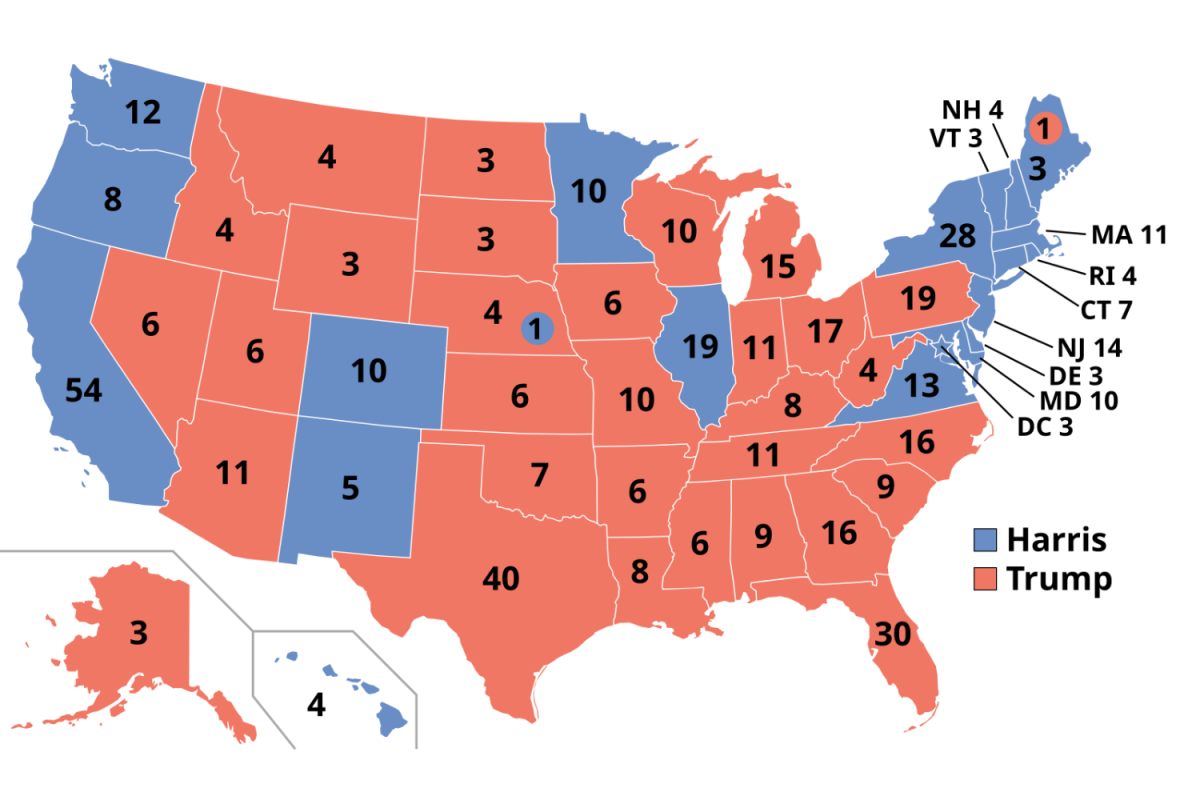Baldwin Wallace University political science students and faculty, and others with connections to politics, gave their opinion and viewpoint on the state of the union moving forward after Donald Trump was elected as the next president of the United States.
AJ Keller, a senior education major and former president of the BW College Republicans, has a positive outlook on the nation moving forward, citing hope for the economy and efficient government operation.
“I think the state of the union going forward is a lot more positive and offers a much brighter future than if we were to continue on the path of the previous four years,” Keller said.
“I think that running a campaign focused on the economy and improving the economy really offers a bunch of economic incentives to kind of brighten the horizons of the country, but I think also creating the Department of Government Efficiency to cut down on wasteful spending, wasteful positions and so on, just really creates a much more positive government and efficient government going forward,” Keller said.
Derek Larner, a political science major, said that he thinks the country is not going in a positive direction by electing Trump, due especially to Trump’s views on immigration and the safety of the nation.
“I would say that generally I am worried about the direction of this country,” Larner said. “I think that a lot of his Cabinet picks that he’s chosen show the very anti-immigrant nature of this country. I think that the policies that he’s going to implement will go after immigrants of all backgrounds and all stories in this country.”
“I think that generally, the State of the Nation is not going to go in a very positive direction. I think you saw that in his first administration in a lot of ways, and I believe now there’s not as many safeguard people in his cabinet [that will] kind of reel him in and try to moderate his position. I think that we’re going to see some of the most extreme elements of the Republican Party agenda brought out through the people that he staffs…” Larner said.
Whitney Mannies, assistant professor in the Department of Politics and Global Citizenship, said that the result was “not surprising” due to global trends of people becoming “less committed to democratic norms.”
“It’s just one more installment in this consistent trend that we see, not just here, but everywhere in democracies, of people simply becoming less committed to democratic norms and democratic institutions,” Mannies said.
“You vote for somebody who tries to overthrow an election result, who consistently tries to circumvent constitutional checks on power, promises to use the power of the presidency to pardon his allies and attack his political enemies. This is not the kind of behavior or the kind of norms that we would expect from an American president, but it’s absolutely in line with national and global trends that are disaffected with democracy and less committed to democratic norms and principles,” Mannies said.
Mannies said that a big reason people are becoming “less committed to democratic norms” is because of worries over the state of the economy moving forward.
“I would say that economic anxiety is a big part of that,” Mannies said. “When people feel like they aren’t going to get ahead, that work doesn’t yield a better life, that there’s limited economic opportunity, that the future generation will be worse off than the current generation. When you have that kind of economic anxiety and you don’t feel like your democratic institutions are doing a good job of alleviating that anxiety, that leads to lack of commitment to democratic institutions and norms.”
“A big part of the puzzle is that, not just Americans, but people in democracies everywhere, often care more about economic well-being than they do about democratic norms, checks and balances, constitutional protections, etc,” Mannies said.
Larner said that, while he does not necessarily think Trump’s economy will help the working class, he remains hopeful that Americans may begin to feel the effects of the Biden economy moving forward.
“I don’t see a lot of policies that are going to help real working-class Americans, but I remain optimistic that the economy will get under control,” Larner said.
“I think what it really comes down to is people noticing positive change in the economy. I think right now, under the Biden administration, we’ve had record low unemployment. We’ve had high numbers of jobs and wages still remain stagnant, but folks aren’t feeling those positive effects. So, I hope that in the next four years, people are able to feel those effects, whether it be at the grocery store or at the gas stations,” Larner said.
Keller had a more positive view of Trump’s economy and said that he is excited for the potential his presidency could bring.
“I think that creating those economic incentives, I think that fixing some of the broken systems that we have in place right now, will really unlock some potential for the next Republican, because, of course, Trump can’t run again,” Keller said. “So, I think that it really opens the door to some very, very prosperous futures for the country, especially depending on who runs in four years. So, I most definitely think we’ll be at a better place [four years from now].”
These “broken systems” Keller mentioned are, according to him, mainly the Department of Justice and the Department of Education; however, being an education major, Keller does not agree entirely with Trump’s position.
“Of course, I’m worried about education,” Keller said. “I think I disagree with Trump’s viewpoint of completely getting rid of the Department of Education at the federal level, but I think just scaling back and taking a look at what’s going on there, most definitely is something that’s good.”
Larner stressed the importance of maintaining firm restraint on the President’s power, lest the nation face major issues in the 2028 election.
“As much as I’m worried about the policies that these folks are going to implement… I still believe America will get through the next four years,” Larner said. “I think that there’s still folks out there who truly want to see the best for the country, and we still do have a system of checks and balances in place to hopefully keep the president in check.”
While Larner and Mannies both expressed concern over the president’s power and effect on democracy moving forward, Keller said that he believes Trump will have a positive impact on democracy and said that the opposing argument is “absurd.”
“I don’t really understand the argument of the negative aspect of democracy,” Keller said. “I mean, of course, yes, you can cite Jan. 6, but to say that he’s this entire threat to democracy, I think, is just absurd.”
Despite this, Mannies believes our republic will be “weakened” due to Trump’s victory.
“The form of government that we have is valuable, and checks on power, limited government, constitutional protections, workers’ rights, labor unions, those things are the substance of the United States of America, our republic,” Mannies said.
In terms of young people, particularly students, Larner said that he thinks there are issues to be concerned about moving forward, from LGBTQ+ rights to college debt.
“I think that young people should be concerned about the future outcomes of this election, whether it be dealing with access to reproductive health products, whether it be the defense of LGBTQ rights, whether it deals with college debt and affordability, housing, students who have been impacted by the wars, not only in Ukraine, but also Gaza. I think students across this country are going to feel the effects that it has on other folks as well,” Larner said.
Keller, on the other hand, said that he does not think student life will be affected as much as many think, and he said that he is not worried about minority rights being taken away, citing mainstream media fear tactics as the reasoning behind these kinds of worries.
“To be honest, I’m not [worried]. Trump just achieved more minority votes than any Republican in history,” Keller said. “I think that large swarms of minorities are realizing that the narrative the mainstream media plays is not the most truthful.”
“As for women’s reproductive rights, I also think that is a product of misguiding by mainstream media. Trump supports making health insurance companies fund IVF treatment, which is a big, big win for women and their reproductive rights. And he’s also came out and openly said that he will not support a national abortion ban anyhow. So, I think a lot of the concerns… are actually centered around just mainstream media scare,” Keller said.
Despite the varying opinions on what the United States will look like in the next four years, only time will tell the future of the country.
“We just got to keep fighting forward,” Larner said. “I mean, the outcome’s been decided. We know what’s coming, and we just got to be ready to take that head on.”
































